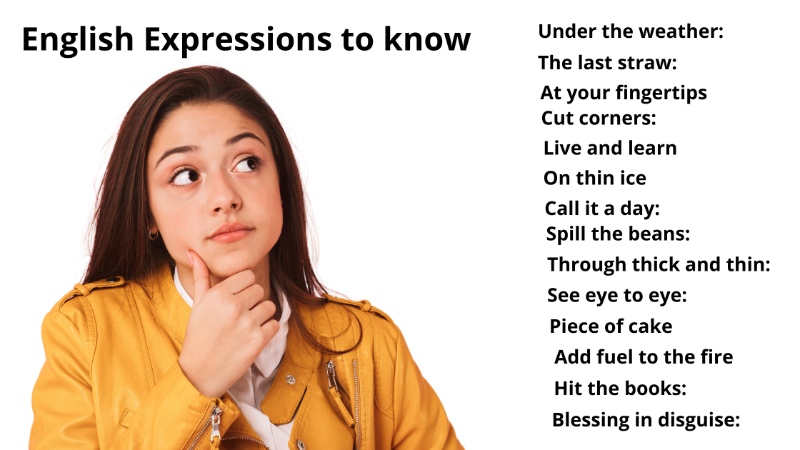The most important English expressions you should know
English is an expressive language...!

There is always a word or phrase to describe most actions, emotions, situations or reactions. It is also full of creative forms of expression. This also makes it an interesting language.
However, for new speakers understanding such expressions without any frame of reference can be difficult. It is also confusing because it is mostly full of colloquial expressions which may have cultural references. New learners may struggle to understand these and eventually even have trouble using them in daily conversation.
A good way for new learners to learn Englishexpressions is by reading up. This allows learners to familiarize themselves with the different expressions and their meanings. Many times the words in an expression may mean different things on their own but together the meaning changes. This makes it difficult to identify these expressions in any conversation. By reading different expressions, it makes it easier to identify different expressions in everyday conversation.
As a learner identifies different expressions in someone else's speech, it becomes easier to remember to use their phrases in their own speech.
Most expressions are not used in everyday speaking by most fluent speakers. However, there are some expressions that are used more often than others.
Under the weather:
- Meaning:If someone is or feels under the weather, they feel ill
- Examples:
- I think that she is undertheweatherat the moment.
- He is now apparently undertheweather.
- They continued to work even though they felt a bit under the weather.
- I will not be able to complete the task today because I am feeling slightly under the weathertoday.
Wrap your head around something
- Meaning:to succeed in understanding something difficult or strange
- Examples:
- I find it hard to wrap my head around such complexissues.
- She struggled to wrap her head around the news.
- How did you wrap your head around this?
- He wrapped his head around the new responsibilities that came with moving to a new city.
At your fingertips
- Meaning: If you have information at your fingertips, you can get it and use it very easily; or convenient and easy to find
- Examples:
We have all the latest statistics at our fingertips.
1. He had the facts at his fingertips.
2. She remembered the information at her fingertips.
3. Do you recall the numbers at your fingertips?
Live and learn
- Meaning: said when you hear or discover something that is surprising
- Examples:
- I did not know she lived in my neighbourhood. You live and you learn.
- No matter how much you prepare, things can still not work out. I guess you live and learn.
On thin ice
- Meaning: to be doing something that is dangerous or involves risks
- Examples:
- By lying to the boss, he is on thin ice at work.
- She was skating on thin ice by waiting until the last minute to prepare for the exam.
- Do you think I amthin ice because I skipped too many days of school?
Spill the beans:
- Meaning: to tell people secret information
- Examples:
- Do not spill the beans about the surprise party.
- I think she spilled the beans about the mistake we made.
- Did you spill the beans about his background?
- So who spilled the beans about the proposal he has planned for her?
Through thick and thin:
- Meaning: If you support or stay with someone through thick and thin, you always support or stay with them, even if there are problems or difficulties
- Examples:
- I commend her for sticking by him through thick and thin.
- Would you stand by me through thick and thin?
- I want to thank you for being there for me through thick and thin.
- My mother has been with me through thick and thin.
See eye to eye:
- Meaning: If two people see eye to eye, they agree with each other
- Examples:
- We do not see eye to eye on working styles.
- Do you see eye to eye with your siblings?
- They fought because they did not see eye to eye on the problem.
- I hope we see eye to eye moving forward.
These are not all the expressions commonly used in the English language. It depends on the situation and who you may be speaking with. Many times, these expressions are used in written English. However, this is a good place to start. There are some others you can also use often.
Piece of cake
- Meaning: something that is very easy to do
- Examples:
1. This project was a piece of cake.
Add insult to injury:
- Meaning: to make a bad situation worse
- Examples:
- I was late to work and to add insult to injury, I forgot my documents at home.
You cannot judge a book by its cover:
- Meaning: said to show that you cannot know what something or someone is like by looking only at that person or thing's appearance
- Examples:
- He was not dressed professionally, but his technical skills were beyond any other candidates’. This just goes to show that you cannot judge a book by its cover.
Cut corners:
- Meaning: to do something in the easiest, cheapest, or fastest way which way not be the best way to do it
- Examples:
- The projects were mismanaged and they cut corners while selecting materials.
Call it a day:
- Meaning: to stop what you are doing because you do not want to do any more or think you have done enough
- Examples:
- After working at this job for nearly three decades, he decided to call it a day.
Blessing in disguise:
Meaning: something that seems bad or unlucky at first, but results in something good happening later
Examples:
- Waking up late and missing the bus was a blessing in disguise, because my classes were cancelled for the day.
Add fuel to the fire
Meaning: to make an argument or bad situation worse
Examples:
- I did not want to add fuel to the fire by commenting on the situation.
The last straw:
- Meaning: the latest problem in a series of problems, that makes a situation impossible to accept
- Examples:
- Not being allowed to take a decent lunch break was the last straw for most of the disgruntled employees.
Hit the books:
- Meaning: to study
- Examples:
- I should hit the books so I cannot go to the movies tonight.
On cloud nine:
- I was on cloud nine when I got promoted.
How many of these have you used before? How many do you think you can use often?

visit Clapingo blogs
These expressions can replace long sentences and reduce the confusion you face while thinking of the right set of words. So think of different scenarios in which you can use these expressions to be ready for any time you may need to use them.
Keep learning more expressions to make yourself sound more creative and advanced while speaking. It may seem difficult at first but keep trying. You will definitely begin to enjoy using and learning new expressions.
For more helpful tips and tricks,visit clapingo
Contents
- English is an expressive language...!
- Under the weather:
- Wrap your head around something
- At your fingertips
- Live and learn
- On thin ice
- Spill the beans:
- Through thick and thin:
- See eye to eye:
- Piece of cake
- Add insult to injury:
- You cannot judge a book by its cover:
- Cut corners:
- Call it a day:
- Blessing in disguise:
- Add fuel to the fire
- The last straw:
- Hit the books:
- On cloud nine:
Comments
Your comment has been submitted